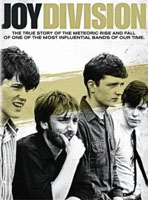If a band plays in a garage and nobody is there to hear them, is that band still revolutionary? Maybe, but they'll never have a loving rock documentary like Joy Division made about them. Joy Division are one of those vaguely famous bands who have been copied so endlessly by modern groups (I won't mention names), it's difficult now to comprehend how groundbeaking they really were. You've heard them, but you haven't heard them. Grant Gee's thoughtful documentary Joy Division fills the gap between the music and the image for the most casual of listener, which is, in Joy Division's case, whether they know it or not, pretty much everyone.
Joy Division is a band that is universally hailed as being fantastic and yet so much of the media surrounding them focuses on the short-lived trajectory of lead singer Ian Curtis. Curtis took his life by hanging at the age of 23, a day before Joy Divison were to embark on a tour of the United States ("America", as they would've said), thus missing the hallowed and Boomer-heavy 27 club by a portent 4 years. Comprehensively researched and compiled with an eye to authenticity, Joy Division promises to be a documentary beyond just being "The Ian Curtis Story", which has already been told by the similarly somber Control. Though film makes a genuine attempt to put heavy focus on the contributions of the other band members to the collective entity known as "Joy Division", it fails in that regard. Curtis dominates the film, a weirdly magnetic presence hovering around the edge of every frame. But it is a convincing failire. After viewing Joy Division, this reviewer is entirely of the mind that it is impossible to separate Curtis from the band he fronted because in essence the story of Joy Division is the story of Ian Curtis and there could be no illumination of one without the exploration of the other.
The origins of the band are rooted in sooty, post-industrial Manchester, which birthed the industrial revolution but also bore its consequences more heavily than most. Joy Division at first promises to tie music to landscape by focusing on how the cityscape was a direct influence on the tonal qualities chosen later by the band. One member remarks that he had never seen anything pretty while growing up, an offhand remark that speaks volumes more than it seems to. The track is abandoned however, when the mesmerizing Curtis comes into the picture (rather late) after a pivotal Sex Pistols gig. The meteoric rise of Joy Division is then set into motion, with a thoughtfully brisk pace. Gee is to be commended for not rushing his film and instead letting it play out in an unassuming way, mimicking the sort of bemused wonder in the voices of Bernard Summner, Peter Hook, and Stephen Morris when they talk about their time in Joy Division.
What is remarkable about Joy Division is how it makes so much out of so few images of the band's history. It's shockingly shocking how much technology has changed the way memory is recorded in the public mind. Without affordable video cameras or digital anythings to capture every minute of every day for posterity, so much of Joy Division's history lies solely in the minds of those who were there. Gee collects television footage, concert films, pictures, radio snippets, and diary pages in a way that illustrates, but doesn't overshadow the words relating the tale in the first place.
If the film has a flaw it lies in the uneven view it takes of its subject. Despite being admiringly cohesive, it's just addicted to hyperbole. After a while it becomes tiresome listening to awestruck fans describe the band as world-shattering and perfect. While this may be true, we don't need to hear it over and over again. All is forgiven though when the documentary brings the focus back to what matters: the music.
The fact that the band was able to grow so massively in such a short period of time without the twin crutches of globalization and the Internet speaks to the immediacy of their music and the "rightness" of their moment, if there is such a thing as cosmic meaning. The greatest thing Joy Division achieves is making the audience want to go home and listen to their records, and there's really not much more you can ask from a rock documentary than that.











